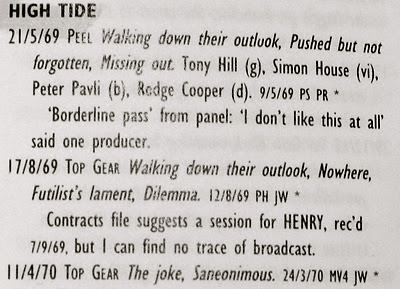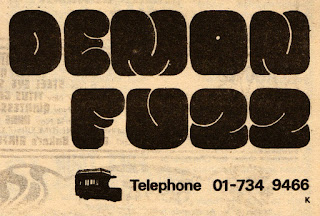Horn-rock is a genre you rarely hear good things about, but it was big business between 1969 and 1971 or so. One of the best albums in the genre is the sole effort by Satisfaction, led by the hard-working Mike Cotton (who'd released an LP with The Mike Cotton Sound in October 1964 and gigged with the Beatles, but had no real success), aided by the excellent guitarist Derek Griffiths (formerly of the Artwoods) and bassist Lem Lubin (formerly of Unit 4+2). Listen here and here for evidence.
The band formed in May 1970. On August 8th the following article appeared in Music Now:
A week later, Music Now featured them again:
The following month they described their aims to Chris Welch in Melody Maker:
Their album was produced by the great David Hitchcock in September, and appeared in February 1971, as did a 45 pairing the non-LP Love It Is with Cold Summer. Here are the LP's front and back cover:
Decca placed this advert in the music press to promote it:
Reviewers were impressed. ‘A group we will be hearing more of,' wrote Disc & Music Echo on February 6th. 'On Satisfaction (interesting sleeve) the six-piece gives out a full sound as professional as any you’ll hear doing the rounds today.’ Record Mirror agreed, calling them ‘a good, tight band with some surprisingly sensitive vocal harmony moments. There are other moments where they veer into the world of the musically improbable, but no matter – the sounds herein are exclusively the sounds of Satisfaction.’ Melody Maker, meanwhile, went for broke: ‘Hang out more flags. Here’s a band we can be proud to proclaim. It’s a remarkable sound – adult, mature and convincing. The vocals are exceptional and the writing is also of a high standard.’
To promote the LP the band played numerous gigs, including an unlikely lunchtime session in a pub in Tottenham Court Road on February 19th:
Dennis Detheridge of Melody Maker was on hand, but wasn't overly impressed:
Reader Vincent Lawless of Sheffield was more enthusiastic, writing in as follows:
The answer to his question, unfortunately, was 'no'. Melody Maker ran another interview with Cotton on March 20th:
Though the article described Satisfaction as 'one of the most exciting bands in Britain', their final release (a non-LP 45 that appeared in July) sank without trace.
Satisfaction split sometime in the autumn of 1971, with Cotton taking his horn section to the Kinks in time to make their Muswell Hillbillies LP, which appeared that November.
The band formed in May 1970. On August 8th the following article appeared in Music Now:
A week later, Music Now featured them again:
The following month they described their aims to Chris Welch in Melody Maker:
Their album was produced by the great David Hitchcock in September, and appeared in February 1971, as did a 45 pairing the non-LP Love It Is with Cold Summer. Here are the LP's front and back cover:
Decca placed this advert in the music press to promote it:
Reviewers were impressed. ‘A group we will be hearing more of,' wrote Disc & Music Echo on February 6th. 'On Satisfaction (interesting sleeve) the six-piece gives out a full sound as professional as any you’ll hear doing the rounds today.’ Record Mirror agreed, calling them ‘a good, tight band with some surprisingly sensitive vocal harmony moments. There are other moments where they veer into the world of the musically improbable, but no matter – the sounds herein are exclusively the sounds of Satisfaction.’ Melody Maker, meanwhile, went for broke: ‘Hang out more flags. Here’s a band we can be proud to proclaim. It’s a remarkable sound – adult, mature and convincing. The vocals are exceptional and the writing is also of a high standard.’
To promote the LP the band played numerous gigs, including an unlikely lunchtime session in a pub in Tottenham Court Road on February 19th:
Dennis Detheridge of Melody Maker was on hand, but wasn't overly impressed:
Reader Vincent Lawless of Sheffield was more enthusiastic, writing in as follows:
The answer to his question, unfortunately, was 'no'. Melody Maker ran another interview with Cotton on March 20th:
Though the article described Satisfaction as 'one of the most exciting bands in Britain', their final release (a non-LP 45 that appeared in July) sank without trace.
 |
| Belgian picture sleeve |
 |
| Italian picture sleeve |















































